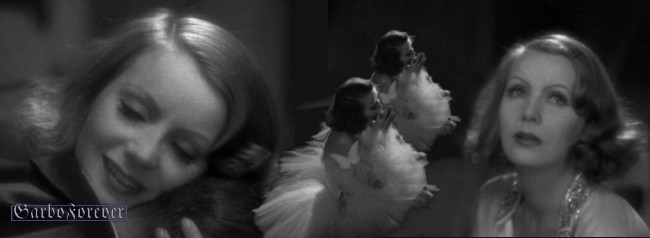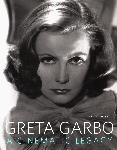 GRAND HOTEL |
||
(USA 1932)
|
||
| ALTERNATE TITLES | ||
| Menschen im Hotel (GERMANY)
|
||
| FILM SCENES | ||
|
|
||
| COMPANY | ||
Metro-Goldwyn-Mayer (MGM)
|
||
| CREDITS | ||
Directed by Edmund Goulding.
|
||
| TECHNICAL SPECS | ||
112 minutes
|
||
| GRAND HOTEL TRAILER | ||
| See HERE!
|
||
| CAST | ||
Greta Garbo, John Barrymore, Joan Crawford, Wallace Beery, Lionel Barrymore, Lewis Stone, Jean Hersholt, Robert McWade, Purnell B. Pratt, Ferdinand Gottschalk, Rafaela Ottiano, Morgan Wallace, Tully Marshall, Frank Conroy, Murray Kinnell, Edwin Maxwell...
|
||
| GARBO'S CHARACTER | ||
Madame Grusinskaja aka Elisaveta Alexandrowna Grusinskaja
|
||
| FILM POSTER | ||
|
||
| SYNOPSIS | ||
Grusinskaya (Greta Garbo) comes to stay at the Grand Hotel in Berlin. A famous ballet star, she is to perform at a theatre in the city. Baron von Gaigern (John Barrymore), an adventurer, has come to the hotel to steal her jewels. After a performance, Grusinskaya returns to her apartment, dejected about her career. The Baron is there, but hides when she enters. Seeing that she is contemplating suicide, he reveals himself and claims he has come there because he is an ardent admirer. Eventually, they fall in love. Also at the hotel is Kringelein, a bookkeeper, who has an incurable disease and plans to enjoy his last moments on earth. He falls in love with Flaemmchen (Joan Crawford), a stenographer, but she desires wealth. Preysing (Wallace Beery), an industrialist, has come to the hotel to negotiate a business deal which backfires. He is attracted to Flaemmchen and she, wanting money, agrees to have an affair with him.The Baron, meanwhile, has told Grusinskaya that he will meet her elsewhere after she departs from the hotel and they can start a life together. Needing money, he attempts to rob Preysing's apartment. Preysing catches and kills the Baron. Kringelein keeps Flaemmchen out of the way when Preysing is arrested. Flaemmchen agrees to go away with Kringelein to spend the rest of his days traveling with him. They both hope someone, somewhere, has a cure for hidisease. Grusinskaya departs with her staff from the hotel, happily planning her new life with the Baron, unaware that he is dead.
|
||
| QUOTES FROM THE FILM | ||
| Grusinskaya: "I think Suzette, I haf never beeen so tyrhd een my life!"
|
||
| AUDIO-FILE | ||
|
||
| MOVIE PROGRAM | ||
|
||
| PREMIERED/RELEASED | ||
Premiere date: April 12, 1932 (Astor Theatre in New York)
|
||
| LOBBYCARDS | ||
|
||
| PRODUCTION | ||
| Production Dates: December 1931–February 1932
|
||
| MOVIE STILLS | ||
| The Stills were made during the production by M. Brown, Fred Archer and George Hurrell. George Hurrell didn't made any of Garbo for the film. 128 Movie Stills were shot.
|
||
| TRIVIA | ||
|
||
| BACKGROUND STORY | ||
| (in Treatment)
|
||
| BUSINESS DATA | ||
| Budget: 700.000 Dollar.
|
||
| PORTRAITS | ||
Garbo's portraits for Grand Hotel were taken by Clarence Sinclair Bull on April 13, 1932, during the session for As You Desire Me.
|
||
| REVIEWS | ||
John Mosher for The New Yorker: |
||
In spite of the brevity of her appearance, against what many a star would call ground odds, Garbo dominates the picture entirely, making the other players merely competent performers, in my opinion; giving the tricky, clever film a lift, a spring, such as pictures without her, without that intense, nervous vitality she's got, cannot possess.
|
||
| Percy Hammond for New York Herald Tribune: | ||
When, not long ago, I questioned the infallibility of Miss Greta Garbo's deportment in Grand Hotel, I was unaware of the passionate esteem in which she is held by the film-lovers. Of course; it was known that, like many of her sisterhood, she was enshrined as something holy, sanctifying the places of her performance with the perfumed incenses of her Art. But it was not suspected that she was guarded by a numerous garrison of warlike knights and ladies sworn to shield her from agnostic assaults and batteries. I thought that one could speak of her with the same impudent freedom that one enjoys when disparaging the work of artists of the human drama, without fear of reprisals. No impression, however, could have been more erroneous. Since the publication of my doubts I have been peppered with so many angry letters that I am tempted never again to come within the measure of the screen-fan's wrath. To fellow foreigners intruding on cinema criticism the advice is hereby given, that if they don't like Miss Garbo they'd better go back where they came from. “When in a strange land worship the gods of the place, whatever they are.” |
||
| Vicki Baum, author of Grand Hotel, for Modern Screen: | ||
| If I say that Greta Garbo as the dancer is much better than I expected, that's not of small consequence. For I expected the utmost. I expected that she'd be Greta Garbo and that would have been enough! But this time she did more than usual. She played, so to speak, two roles. First, the weary, lonely dancer, aching for success–and then the awakened woman experiencing a great love. I've always maintained that the ability to transform one's self constitutes great acting.... In Grand Hotel it's quite different. There were five main roles–the characters were there first and then came the actors–and I'm afraid that not a single one of the big stars viewed his part with much pleasure at first. Here Greta Garbo has achieved something which few people expected of her. She has fitted herself into a play and into a cast and has rendered a great performance exactly at that point where the role was contrary to her own being. The twittering, laughing, hopping about, in the tarlatan of a ballet skirt is certainly not what Greta would have sought out as her role. But she has accomplished it. She's gone the whole way which led from her first words, “I have never been so tired in my life,” to the last words, “It will be sunny in Tramezzo. We'll have a guest, Suzette.” That dead-tired face in the beginning–where did Greta get those small sad lines around her mouth and forehead? Then, that face in which–between laughter and tears–love awakens! That face full of wanton joy when she is happy. That face full of fear when she waits for her beloved in vain. Unforgettable! Thank you, Greta Garbo.
|
||
| SIMILAR FILMS | ||
| Week-End at the Waldorf – with Ginger Rogers (MGM, USA 1945)
|
||
| THE FAMOUS GROUP PHOTO | ||
Since Garbo only interacted with John Barrymore in Grand Hotel, MGM’s solution for placing her prictorially within the all-star cast was to paste her into the group photo.
|
||
| PICTURE FROM THE FILM-SET | ||
Director Cukor and Garbo
|
||
| STORY FROM THE FILM-SET | ||
(in Treatment)
|
||
| ALTERNATE SCENES | ||
| (in Treatment)
|
||
| AUDIO-FILE | ||
|
||
| THE "I WANT TO BE ALONE" QUOTE | ||
For moviegoers, Grand Hotel stands as the film where Greta Garbo finally voices the words that had long been attributed to her: “I want to be alone.” She speaks these words, first pathetically to her maid and manager, then as a plaintive cry; and, finally, as a futile declaration to a stranger. The stranger becomes her lover and she is no longer alone. The novel and playscript both had Grusinskaya say , “I wish to be alone.” Director Goulding changed that to “I want to be alone,” which sounded like something that Garbo would really say. And he had her say it not once, but three times. Greta later declared that the sentiment wasn't hers. She never said she wanted to be alone, only that she wanted to be left alone. The subtleties in meaning were lost on her followers. To them, the public and private personas of Greta Garbo were one and the same – “being alone” was the operative phrase.
|
||
| MADAME GRUSINSKAJA DOLL | ||
|
||
| THE ORIGINAL NOVEL | ||
| Based on the novel Menschen im Hotel by Vicki Baum.
|
||
| THE SCREENPLAY | ||
You can read it HERE!
|
||
| DVD/VHS | ||
Available on DVD & VHS.
|
||
SOURCE |
||
Greta Garbo: A Cinematic Legacy – by Mark A. Vieira (Harry N. Abrams, Incorporated, New York 2005). This is the best and most accurate book about Garbo's-Films.  |
||
OTHER SOURCES |
||
Karen Swenson – A life Apart Barry Paris – Garbo IMDB – International Movie Database plus many other books, magazines and internet sites. |
||
| Film - Introduction |
© Copyright 2005 – www.GarboForever.com – Germany – TJ & John – The Webmasters